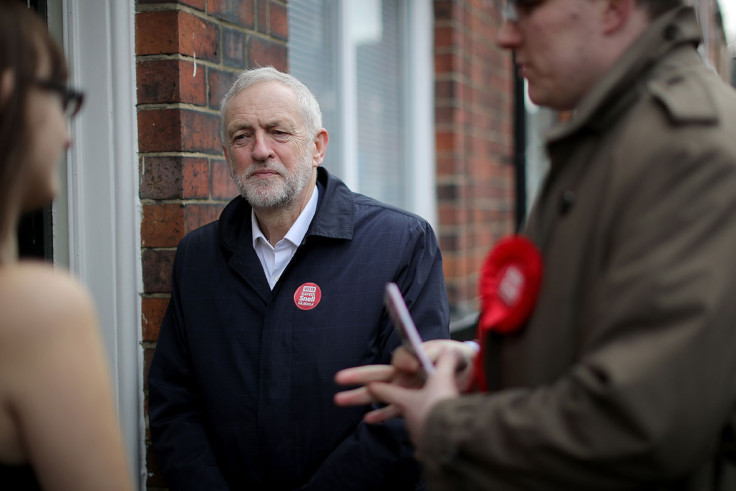Jeremy Corbyn is why Labour lost Copeland – the party is the Titanic and he is its giant hole
Labour's problems run deeper than Corbyn but he is the main reason it lost the Copeland by-election.
The reason for Labour's dismal showing in the Copeland and Stoke by-elections is obvious to anyone apart from diehard supporters of the man responsible and political journalists. Jeremy Corbyn is simply not viewed as a credible figure to lead the country, let alone at a time of instability over Brexit.
It is true of course – and it has become a cliché to say so – that Labour's problems run deeper than Corbyn alone. But this is true only in the sense that the Titanic's problems were greater than the gaping breach in its hull. Corbyn's personal ratings are now worse than Michael Foot's were at the same point in his leadership. Just 24% of voters are satisfied with Corbyn's performance, compared to 62% who are dissatisfied.
Things are of course more complicated than that, but it is the job of political journalists to make them seem more complicated still. The same was true after Labour's unexpected electoral defeat in 2015.
No one wanted to write the column saying Labour lost largely because the public thought its leader was useless and weird. It would have been too personal but also too predictable. And so peripheral things were instead blown up out of all proportion to pad out the hand-wringing opinion pieces that people were obliged to write in the aftermath.
The Titanic also had bulkheads that water could flow over the top of into adjacent compartments. That was not why it sank. It sank because it had a giant hole in it. Labour has a giant hole in it. He leads the party. The excuses are flying in but Labour should be winning comfortably in places like Copeland – it has previously won there in every election since 1935. Similarly, the party should not be losing ground in Stoke – traditionally a solid Labour seat and a place where the right-wing vote in this election was split between Ukip and the Tories.
As Theo Bertram has pointed out, Labour wins elections when it increases its vote share among skilled C2 voters and keeps the Tory C2 vote down. What we are seeing at the moment is the precise opposite: Labour's support among working class voters is at the lowest level it has ever been. For all the talk of Labour going back to its roots under Corbyn, Labour is increasingly a party of the liberal middle classes, and is growing ever-more detached from the sorts of people the party was founded to represent.
Together with Corbyn's abysmal leadership, Labour's other problem is that many of his most vocal opponents want to themselves retreat into a middle class bubble of a different sort – less student unions and tomes on Marxism-Leninism and more a rootless liberalism of Times opinion leaders and big business.
Indeed, calls for Labour to focus now on winning over Remain voters is not temperamentally dissimilar to the attitude that won Corbyn the leadership of the Labour Party back in 2015. It is to hunker down into one's comfort zone. It is another way of saying that what Labour must do to win power is everything you already wanted it to do.

If it is to move forward, Labour must look like a credible party of government that can steer the best course possible for the country in the aftermath of Brexit. Corbyn's biggest problem is I suspect not that he is insufficiently pro-Remain or pro-Brexit, but that he is insufficiently anything. Labour's messaging is a muddled mess; and anyway, few people believe that Corbyn himself is competent enough to deliver the semblance of something coherent that does come out of his mouth.
The bigger dilemma for Labour is that Corbynism, like Blairism before it, is a strand of middle class politics that has been found out. One claims to be the vanguard that will replace the working class whereas the other believes that the working class has outlived its electoral usefulness.
It is startlingly clear that Corbynism is not the answer to Labour's problems. But nor, I suspect, is a full-throated reversion to the kind of we-know-best paternalism that today seeks to overturn last June's referendum result. The problem for both wings of the Labour Party is that on the most salient issues of the day – workplace rights, immigration, Europe – it is Theresa May, rather than they, who is setting the agenda.
Labour's path to power will, as it always does, require an alliance of working class voters in places like Stoke and Copeland with the progressive-minded middle classes who reside in cities and university towns. I am simplifying slightly, but not a great deal. The party cannot continue to haemorrhage working class support by pursuing Corbyn's brand of confused student union socialism.
But as 2015 ought to have demonstrated, you do not win elections by dying in a ditch for the obsessions of Liberal Democrat supporters.
James Bloodworth is former editor of Left Foot Forward, one of the UK's top political blogs, and the author of The Myth of Meritocracy.
© Copyright IBTimes 2025. All rights reserved.






















